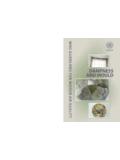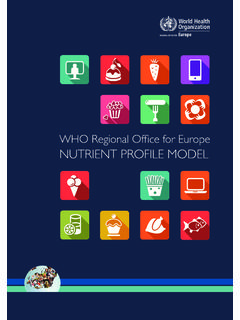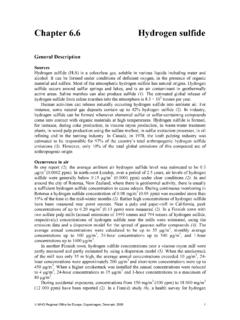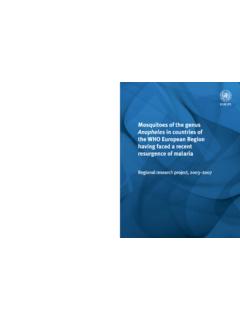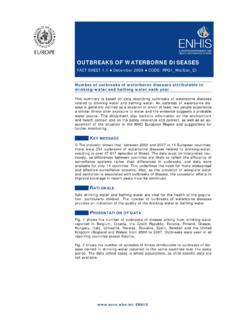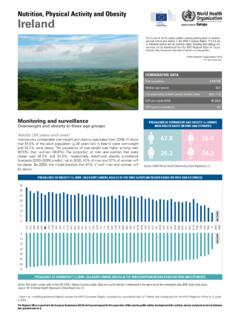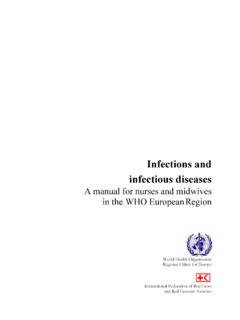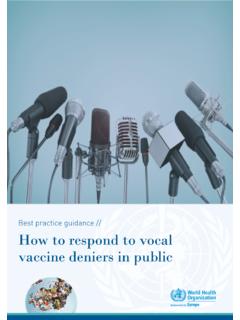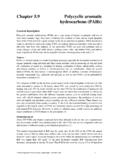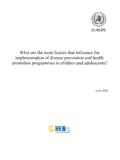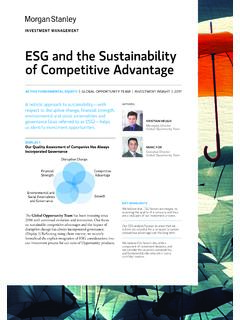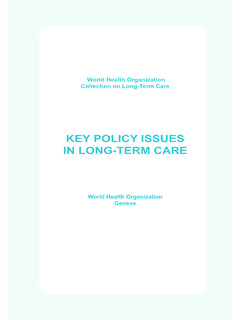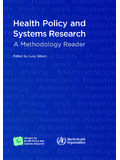Transcription of Monitoring knowledge, risk perceptions, preventive 29 …
1 SURVEY TOOL AND GUIDANCE Rapid, simple, flexible behavioural insights on COVID-19 Monitoring knowledge , risk perceptions , preventive behaviours and trust to inform pandemic outbreak response 29 July 2020 1 Address requests about publications of the WHO Regional Office for Europe to: Publications WHO Regional Office for Europe UN City, Marmorvej 51 DK-2100 Copenhagen , Denmark Alternatively, complete an online request form for documentation, health information, or for permission to quote or translate, on the Regional Office website ( ).
2 World Health Organization 2020 All rights reserved. The Regional Office for Europe of the World Health Organization welcomes requests for permission to reproduce or translate its publications, in part or in full. The designations employed and the presentation of the material in this publication do not imply the expression of any opinion whatsoever on the part of the World Health Organization concerning the legal status of any country, territory, city or area or of its authorities, or concerning the delimitation of its frontiers or boundaries.
3 Dotted lines on maps represent approximate border lines for which there may not yet be full agreement. The mention of specific companies or of certain manufacturers products does not imply that they are endorsed or recommended by the World Health Organization in preference to others of a similar nature that are not mentioned. Errors and omissions excepted, the names of proprietary products are distinguished by initial capital letters. All reasonable precautions have been taken by the World Health Organization to verify the information contained in this publication.
4 However, the published material is being distributed without warranty of any kind, either express or implied. The responsibility for the interpretation and use of the material lies with the reader. In no event shall the World Health Organization be liable for damages arising from its use. The views expressed by authors, editors, or expert groups do not necessarily represent the decisions or the stated policy of the World Health Organization. Photo: WHO/Jonathan Schoeps Document number: WHO/EURO:2020-696-40431-542222 1. Introduction This document provides guidance to Member States in the WHO European Region that wish to conduct behavioural insights studies related to COVID-19.
5 The COVID-19 pandemic outbreak is placing an overwhelming burden on health systems and authorities to respond with effective and appropriate interventions, policies and messages. A poorly timed and managed pandemic response or transition phase can threaten the gains collectively achieved. The pandemic and its restrictions may have affected mental and physical well-being, social cohesion, economic stability as well as individual and community resilience and trust (1-5). In this complex context, understanding how, why and the context in which humans and communities respond allows to 1) anticipate unwanted scenarios and initiate mitigating measures; and 2) implement pandemic response measures that are better informed, situated, accepted and thus more effective.
6 Population surveys can explore perceptions , acceptance of restrictions, mental and physical health, behaviours, information needs, misperceptions and more. WHO Regional Office for Europe and partners are offering Member States a tool to gain such insights which 1) is evidence-informed; 2) can be regularly applied; 3) is flexible to adjust to the changing situation; 4) follows high ethical standards. A few countries have rapidly instigated studies to gain such insights, and more countries are urged to prioritize such efforts to inform and support other response measures.
7 The approach presented in this guidance document was developed based on a framework initiated by the University of Erfurt, Germany, German national health authorities and others (Box 3). This guidance document introduces: guidance on the recommended process and steps a sample methodology advice for obtaining ethical clearance a suggested sample questionnaire (Annex 1) codes for data analysis and establishing a protected website for presentation of findings (Annex 2). WHO Europe s Insights Unit and Health Emergencies Programme are offering support to countries for implementation.
8 We urge all users of the tool to let us know their plans so that we can coordinate and share. This way, we can prevent that two institutions in one country are working in parallel on the same type of study. Please contact Katrine Bach Habersaat or Martha Scherzer 3 Box 1: Suggested approach to behavioural insights research for COVID-19 Any country interested may use the questionnaire (Annex 1) to collect data regarding the public s risk perceptions , behaviours, trust, knowledge and other variables. This data is collected via online panels, and a national research group or private company can be engaged to collect the data.
9 Using a set of codes (Annex 2) the findings can be automatically and immediately transferred to a protected webpage, if desired (examples of what this looks like in Figure 1). The webpage can be easily developed as a subpage on an existing website as decided by the implementing country. This allows national pandemic response groups to use the findings to inform pandemic response measures. In more detail: It is suggested to conduct a serial, cross-sectional study: Data can be collected repeatedly, weekly, with different participants so the status quo can be assessed over time.
10 Repeated assessment of the same core variables allows analyzing changes over time. It also allows comparisons across countries if desired. Changing some variables allows adaptive research to a dynamic situation ( asking for the acceptance of hand washing may be more important in the beginning while adding acceptance of closing schools or a lockdown may be relevant later in the epidemic). This allows in-time and adaptive Monitoring of the variables (such as risk perceptions , knowledge , trust, behaviours and more) and identifying changes over time to assess the relations between them.
